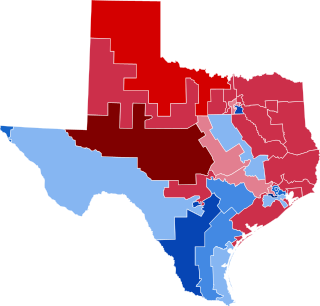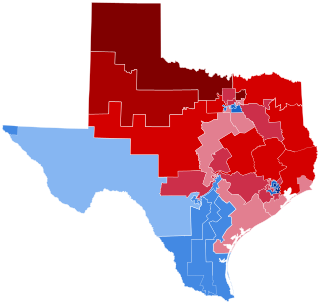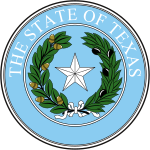
Kent Ronald Hance is an American politician and lawyer who is the former Chancellor of the Texas Tech University System. In his role, he oversaw Texas Tech University, Texas Tech University Health Sciences Center and Angelo State University in San Angelo, Texas. He is also a lobbyist and lawyer. Hance is the only person to defeat future President George W. Bush and became a Democratic member of the United States House of Representatives from West Texas, having served from 1979 to 1985. After his congressional service, he switched to the Republican Party and in both 1986 and 1990 ran for governor of Texas, losing in the primary election.

Charles Walter Stenholm was an American businessman and Democratic Party politician from a rural district of the state of Texas. After establishing himself as owner-operator of a large cotton farm, he entered politics and was elected to Congress in his first run for office. Stenholm was a Democratic Party member of the United States House of Representatives for 13 terms, representing Texas's 17th congressional district from 1979 to 2005.

Robert Randolph Neugebauer is an American politician who was the U.S. representative for Texas's 19th congressional district, having served from a special election in 2003 to 2017. He is a member of the Republican Party. The district includes a large swath of West Texas, including Lubbock and Abilene. According to a 2011 survey by the National Journal, Neugebauer was "the most conservative" member of the House.

Kenneth Michael Conaway is an American politician who was the U.S. representative for Texas's 11th congressional district from 2005 to 2021. He is a member of the Republican Party. The district Conaway represented is located in West Texas and includes Midland, Odessa, San Angelo, Brownwood, and Granbury. Conaway led the investigation into Russian interference in the 2016 United States elections after the Intelligence Committee chair, Devin Nunes, recused himself. Aside from serving as the chair of the House Ethics Committee, he served as the chair of the House Agriculture Committee, and later its ranking member. Conaway indicated in July 2019 that he would not be seeking reelection. Conaway was succeeded by fellow Republican August Pfluger.

The 2003 Texas redistricting was a controversial intercensus state plan that defined new congressional districts. In the 2004 elections, this redistricting supported the Republicans taking a majority of Texas's federal House seats for the first time since Reconstruction. Democrats in both houses of the Texas Legislature staged walkouts, unsuccessfully trying to prevent the changes. Opponents challenged the plan in three suits, combined when the case went to the United States Supreme Court in League of United Latin American Citizens v. Perry (2006).

Texas's 11th congressional district of the United States House of Representatives is in the midwestern portion of the state of Texas, stretching from the Permian Basin through the Hill Country. Major cities in the district are Andrews, Midland, Odessa, San Angelo, and Brownwood. The current Representative from the 11th district is Republican August Pfluger.

Larry Ed Combest is a retired American Republican politician who represented Texas in the U.S. House of Representatives from 1985 to 2003.
The 78th Texas Legislature met from January 14 to June 2, 2003 in regular session, and in three called sessions in 2003, and a fourth called session in 2004. All members of the House of Representatives and all members of the Senate were elected in the 2002 general election, with seats apportioned among the 2000 United States census.

The 2006 United States House of Representatives elections in Texas were held on November 7, 2006, to determine the 32 U.S. representatives from the state of Texas, one from each of the state's 32 congressional districts. These elections coincided with the 2006 midterm elections, which included a gubernatorial election and an election to the U.S. Senate.

The 2008 elections for the Texas delegation of the United States House of Representatives was held on November 4, 2008. 31 of 32 congressional seats that make up the state's delegation were contested. In Texas's 14th congressional district no one challenged incumbent Ron Paul. Since Representatives are elected for two-year terms, those elected will serve in the 111th United States Congress from January 4, 2009, until January 3, 2011.

The 2010 U.S. congressional elections in Texas were held on November 2, 2010, to determine who will represent the state of Texas in the United States House of Representatives. Representatives are elected for two-year terms; those elected served in the 112th Congress from January 2011 until January 2013.

The 2004 United States House of Representatives elections in Texas occurred on November 2, 2004, to elect the members of the state of Texas's delegation to the United States House of Representatives. Texas had thirty-two seats in the House, apportioned according to the 2000 United States census.

The 2012 United States House of Representatives elections in Texas were held on Tuesday, November 6, 2012, to elect the 36 U.S. representatives from the state of Texas—an increase of four seats in reapportionment following the 2010 United States census. The elections coincided with the elections of other federal and state offices, including a quadrennial presidential election and an election for the U.S. Senate. The primary election had been scheduled to be held on March 6, 2012, with a runoff election on May 22; because of problems arising from redistricting, the primary was postponed to May 29, and the run-off to July 31.

The 1996 United States House of Representatives elections in Texas occurred on November 5, 1996, to elect the members of the state of Texas's delegation to the United States House of Representatives. Texas had thirty seats in the House, apportioned according to the 1990 United States census.
There were two special elections to the United States House of Representatives during 2003.
Glen Charles Robertson is an American politician who served two terms as mayor of Lubbock, from May 19, 2012 until May 17, 2016.

The 2014 United States House of Representatives elections in Texas were held on Tuesday, November 4, 2014, to elect the 36 U.S. representatives from the state of Texas, one from each of the state's 36 congressional districts. The elections coincided with the elections of other federal and state offices, including a gubernatorial election and an election to the U.S. Senate.

The 2016 United States House of Representatives elections in Texas were held on November 8, 2016, to elect the 36 U.S. representatives from the state of Texas, one from each of the state's 36 congressional districts. The elections coincided with the 2016 presidential election, as well as other elections to the House of Representatives, elections to the United States Senate and various state and local elections. The primaries were held on March 1.
There were two special elections to the United States House of Representatives in 2003 during the 108th United States Congress.

There were six special elections to the United States House of Representatives in 2021 during the 117th United States Congress.




















